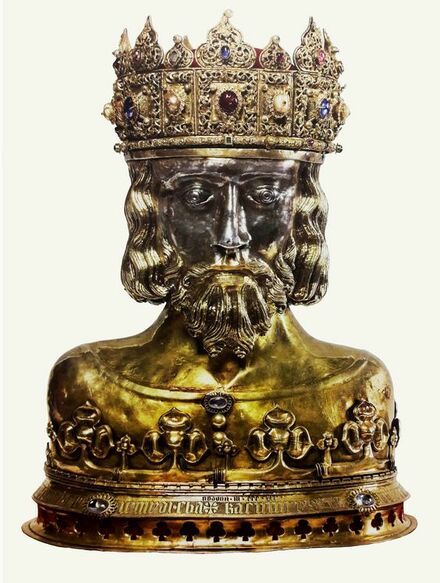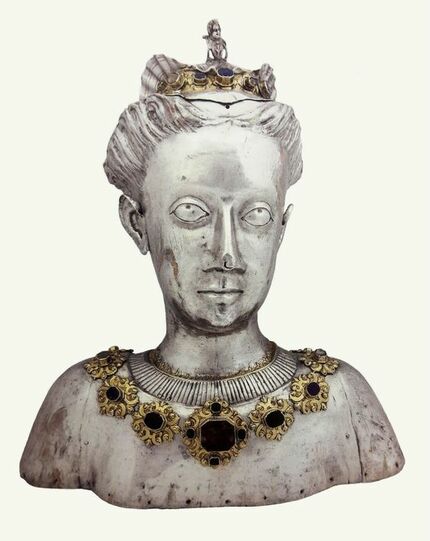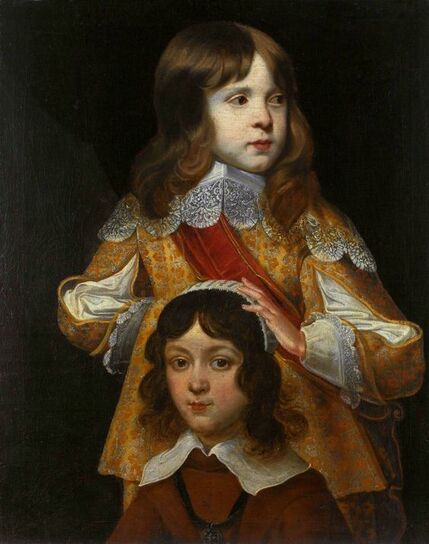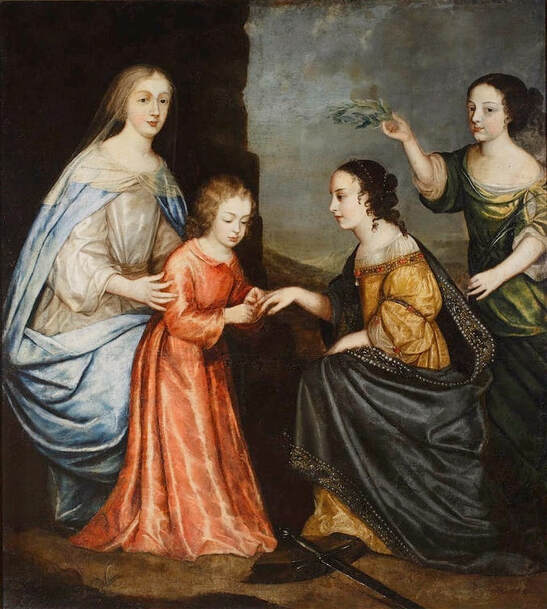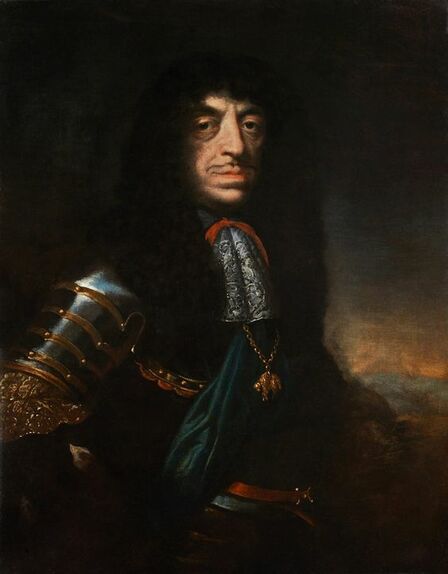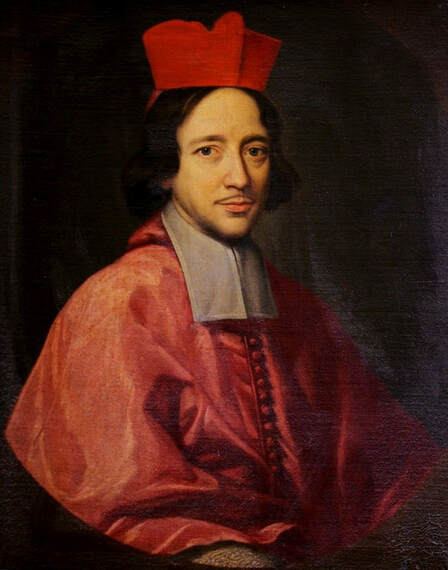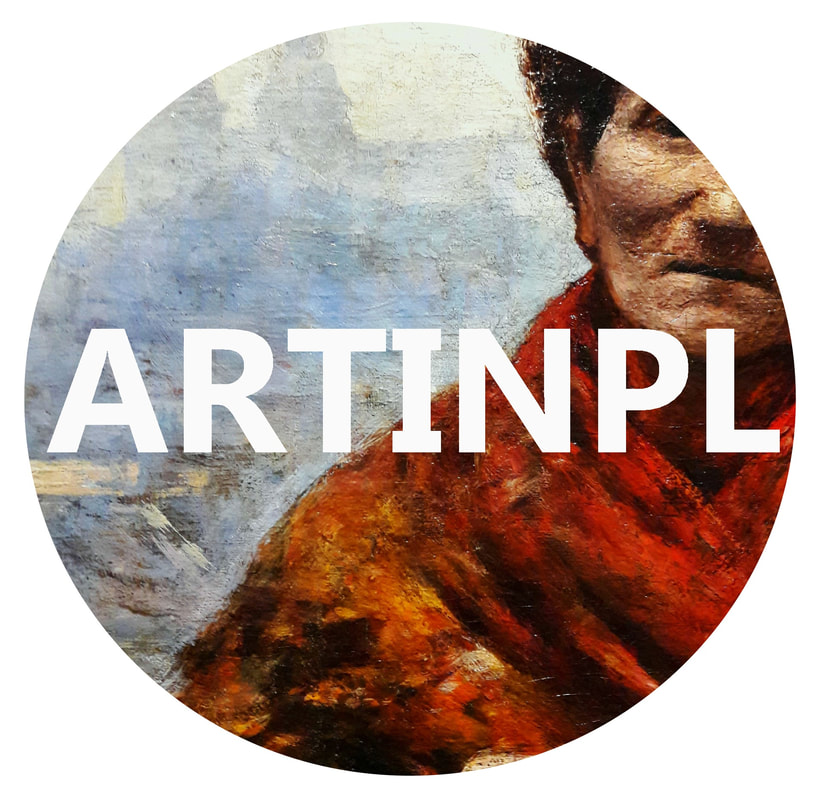|
When in 1598 died queen Anna of Austria, first wife of Sigismund III Vasa, a young a chamberlain of the queen's court and governess to the king's children, Urszula Meyerin, took her position not only in the king's bed but also at the court and in country's politics. This seven-year period between first and second marriage of the king, marked by increasing role of his mistress and "a minister in a skirt" as she was called, is most probably reflected in the reliquary of Saint Ursula in the Diocesan Museum in Płock.
Before 1601 king Sigismund III ordered a goldsmith of Płock, Stanisław Zemelka, to adorn a reliquary bust of his patron Saint Sigismund in the Płock Cathedral with a gold crown from his treasury. Around the same year the king's close ally and protégé, Wojciech Baranowski, Bishop of Płock, commissioned in the workshop of royal goldsmith a silver bust for relics of Saint Ursula from the Płock Cathedral, which was to be transferred to newly established Jesuit Collegium in Pułtusk. Urszula Meyerin, a supporter of Jesuits who corresponded with the Pope and used her influence on the king to appoint her favourites to state positions, deserved the honor to give her effigy to the virgin martyr Ursula, which would be another reason for king's gratitude towards Baranowski. It is also possible that the king, himself a talented goldsmith, participated in execution of this commission, hence the lack of signature on the work.
Silver reliquary of Saint Sigismund with gold Płock Diadem by Anonymous from Kraków (reliquary) and Anonymous from Hungary or Germany (diadem), second quarter of 13th century and 1370, Diocesan Museum in Płock.
Silver reliquary of Saint Ursula in the form of a bust by Stanisław Ditrich, ca. 1600, Diocesan Museum in Płock.
In 1637, when 42-years-old king Ladislaus IV Vasa decided to marry finally, the situation at the court of his mistress Jadwiga Łuszkowska become difficult. It was probably thanks to efforts of king's wife, imperial daughter, Cecilia Renata of Austria, that Jadwiga was married to Jan Wypyski, starost of Merkinė in Lithuania and left the court in Warsaw.
Portrait of Prince Sigismund Casimir Vasa with a page (possibly illegitimate son of Łuszkowska and Ladislaus IV - Ladislaus Constantine Vasa, future Count of Wasenau) by circle of Peter Danckerts de Rij, ca. 1647, National Gallery in Prague.
Around 1659, when the great war, known is Polish history as the Deluge, was coming to the end, it become obvious to everybody that 48-years-old queen Marie Louise Gonzaga would not give a birth to a child, everybody at the court in Warsaw were thinking on possible heir to the throne. Powerful queen gave birth to a son in 1652, but the child died after a month. The old king John Casimir Vasa, former cardinal, who finding himself unsuited to ecclesiastical life, stood in elections for the Polish throne after death of his brother and married his sister-in-law, had however at least one illegitimate child, a daughter Marie Catherine, and possibly a son.
The painting offered by queen Marie Louise to the Church of the Holy Cross in Warsaw in about 1667 and created by court artist around 1659, depicts the eldest son of king’s mistress Katarzyna Franciszka (Catherine Frances) Denhoffowa. 10 years old John Casimir Denhoff as young Jesus, held by childless queen Marie Louise depicted as Virgin Mary, is offering a ring to his mother in the costume of Saint Catherine. Katarzyna Franciszka Denhoffowa nee von Bessen (or von Bees) from Olesno in Silesia and her younger sister Anna Zuzanna were maids of honor of queen Cecilia Renata and stayed at the court after queen’s death. Denhoffowa become a trusted maid of a new queen and her second husband John Casimir. In 1648, she married a courtier of John Casimir, Teodor Denhoff, and a year later on June 6, 1649 she gave birth to John Casimir Denhoff, future cardinal. Godparents of the young Denhoff were none other than king and queen herself. In 1666 at the age of 17 he was made abbot of Mogiła Abbey and between 1670 and 1674 he studied canon law in Paris under protection of John Casimir Vasa.
Mystical marriage of Saint Catherine, possibly by Jan Tricius, ca. 1659, National Museum in Warsaw.
Portrait of king John II Casimir Vasa by Daniel Schultz, 1659, Royal Baths Museum in Warsaw.
Portrait of cardinal John Casimir Denhoff by circle of Giovanni Maria Morandi, after 1687, Private collection.
See more pictures of the Polish Vasas on Pinterest - Artinpl and Artinplhub
|
Artinpl is individual, educational project to share knowledge about works of art nowadays and in the past in Poland.
© Marcin Latka Categories
All
Archives
April 2023
|
